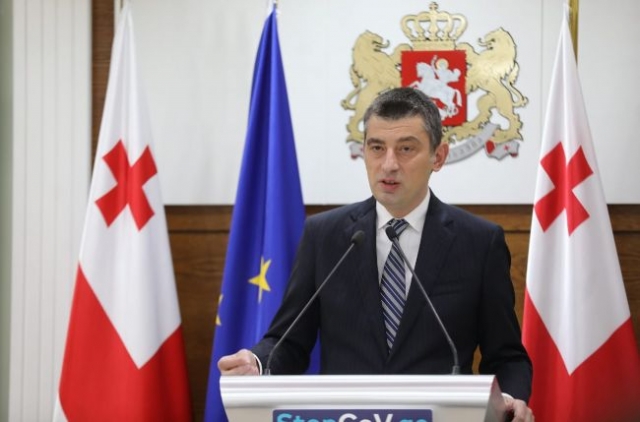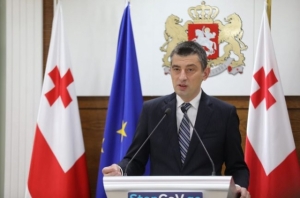PM: Situation is Challenging, though Everything is Manageable
"The situation is challenging, though everything is manageable and similar to the times before August when all of us together managed to strike a balance together with our citizens, medical doctors and police in the best possible manner between the economic interests of the country and human health: we should return to those indicators," announced Giorgi Gakharia, Prime Minister of Georgia, at a press briefing following a meeting of the Inter-Agency Coordination Council held today at the Government Administration.
He noted that the Government of Georgia always chose to strike a balance between the management of the pandemic and economic sustainability, which later grew into an adaptation and this policy or strategy is being effectively pursued further.
“We had a meeting of the Coordination Council today, which considered the current epidemic and economic situation in the country. We have been working for over a week on the design of certain measures, which I wish to discuss today. Though, before I list them specifically, I need to say that the situation is not easy at all. It is challenging, though remains manageable and similar to the times before August when all of us together managed to strike a balance together with our citizens, medical doctors and police in the best possible manner between the economic interests of the country and human health: we should return to those indicators.
"A record-high community transfer rate has been witnessed globally, especially concentrating in Europe. All of us need to understand it well that when I speak of striking a balance, our choice in the management of the pandemic has always been an equilibrium with economic sustainability, which later grew into an adaptation and this policy or strategy is being effectively pursued further,” he stated.
He noted that high mobility and gathering of large quantities of people without compliance to rules has led to the unnatural numbers for Georgia, however, the country was one of the best before August in terms of managing the pandemic.
"It is of principal importance that Georgia was one of the best countries before August in terms of managing the pandemic. What is happening in the country nowadays is an unnatural community transfer rate for Georgia judging by the size of the country and experience gained in managing the dawn of the pandemic before September. That is why we have to introduce rather tight restrictions during the coming two months. What do you think has led to the unnatural community transfer rate? If we think in a logical manner, of course, high mobility and gathering of large quantities of people without compliance to rules has led to the unnatural numbers for the country. Of course, what you listed now is partially caused by the political process as well, as the election campaign envisages quite high mobility of people. I want us all to consider one thing: the healthcare system of the country and the Government of Georgia have sufficient resources to manage 3000-4000 cases of COVID infection daily. Nevertheless, the healthcare system and medical doctors, resources of the sector need to be taken into consideration and any country will be challenged with the task. What we are doing now is to indemnify the system from a further increase of the community transfer rate. We all need to understand it well that street rallies have led to this risk and we ended up jumping from three to four thousand cases a day to numbers I do not wish to indicate,” the PM said.
He also spoke about the Parliamentary Elections held in the country on October 31 and noted that the elections should not have been postponed.
"The number of people turning up to vote for further democratic advancement of the country has evidenced that we should not have postponed the elections," he pointed out.
The PM said that the second wave of the pandemic was an occurrence projected, prepared for and spoken about by the Government of Georgia back in June, July and August.
“Nobody should say that we could have kept the same community transfer rate in absolute numbers as in August if elections were not held in the country. We kept saying that the second wave of the pandemic was an occurrence projected, prepared for and spoken about by the Government of Georgia back in June, July and August. Let me simply repeat that instead of 2 variables we ended up having 3 and had to compromise more, of course,” he stated.
The Prime Minister added that observing basic rules will be of vital importance even on New Year's Eve.
"Besides localized restrictions, we must also take into account the psychological, mental condition of our citizens. We believe that we have been in an epidemiological and economic crisis for about a year," he said, adding that the population’s mobility and observance of rules will determine how well we make it through January.
“Here is how it works: Quite tough restrictions for a bit over 3 weeks, those effective in reducing mobility, and then a 1-week window through the holiday season. However, I repeat that strict control will be enforced over every facility that reopens and operates in this period. At the same time, we are telling our citizens that a period from December 31 to January 15 is effectively holidays, days off. And that has its purpose in that people will make plans in advance. Since the 15th is Friday, and the weekend follows until the 18th, people will have about 3 weeks to make travel plans in advance. And that is important because, during the week of lifted restrictions—though we will keep some of the key systemic restrictions, such as movement restriction after 10 PM, for one, or restaurants on hold and many others—a low level of mobility will be maintained. However, and I agree, compliance with basic rules will be of vital importance during that week. We all understand what the mobility on New Year’s Eve will be like, but observing basic rules will be of vital importance, determining how well we carry on through January. That is why, after January 3, the restrictions in force in the first half of December will be reintroduced throughout the country, though we will, from January 16 through the end of the month, switch to weekend restrictions,” the Prime Minister emphasized.
Information floating about the restrictions to remain in force until the emergence of a vaccine is nothing but a rumor, Giorgi Gakharia explained, and underlined that this is a 2-month plan, from December to February 1.
“These restrictions will remain in force for 2 months. Restaurants will be closed, with only delivery services available, also fitness clubs, swimming pools. The movement restriction after 9 PM will be lifted twice, on New Year’s Eve and the Eve of the Nativity, and weekend restrictions only will come into force after January 16. Municipal transport will operate as usual. Life as usual will carry on 5 days a week. We need these weekend restrictions to keep until early February the results we plan to achieve in December and January. I reiterate that we are talking about measures to prevent a further rapid spike in infection numbers, to secure stability somewhere around 3,000, so that later, starting in February, our doctors may get some rest. And I would like to thank them. But we must remember that we, our citizens, the healthcare system, and all of us, will feel the results of these restrictions only 4-5 weeks later. We must understand that it will not happen until mid-January, which is why we must appreciate the importance of these restrictions. These are not systemic restrictions; this is not a lockdown, because manufacturing and everything continues to work. We are talking about just basic, primary services, such as retail trade, restaurants, and fitness. And these are the largest mobility generators. We all remember what happened in Batumi, with infection numbers starting to grow in Georgia in late September, and now we, unfortunately, have thousands. And a political component also added to it all. We all remember how it all started in Batumi, which is why the decision to impose restrictions in Tbilisi and other big cities, and ski resorts with high risks of infection, was made. There is some information about calls to close all ski resorts in Europe,” he said.












